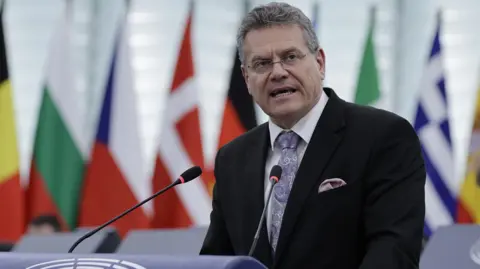EU 'could consider' UK joining pan-Europe customs scheme
 EPA
EPAThe European Union's new trade chief responsible for post-Brexit negotiations has told the BBC that a "pan-European [customs] area is something we could consider" as part of "reset" discussions between the UK and EU.
Maros Sefcovic referred to the idea of Britain joining the Pan-Euro-Mediterranean Convention (PEM).
These are common rules that allow parts, ingredients and materials for manufacturing supply chains to be sourced from across dozens of countries in Europe and North Africa to be used in tariff-free trade.
But Housing Minister Matthew Pennycook told the BBC the government was "not seeking to participate in it at the present time".
The Conservatives did not pursue PEM as part of its post-Brexit deal, but some businesses have said it will help the UK rejoin complex supply chains that have been hit by customs barriers.
Speaking at the World Economic Forum in Davos, Mr Sefcovic said the idea has not been "precisely formulated" by London yet and the "ball is in the UK's court".
The BBC understands the UK government has begun consultations with business over the benefits of the PEM plan that could help cut red tape and improve trade.
Dame Emily Thornberry, chair of the Commons Foreign Affairs Committee, said the post-Brexit agreement negotiated by the Tories had "all kinds of holes" in it.
"Within that agreement there is a mechanism for improving it, and we need to seize that opportunity," she told the BBC's Today programme.
"We need to make sure that within the constraints of the vote to leave the European Union, we nevertheless do everything that we can to get rid of barriers to trade with our nearest neighbours and the people who we trade with the most."
Mr Sefcovic also said that a full-scale veterinary agreement that helped reduce frictions on farm and food trade should be reviewed.
Single market treatment for UK food and farm exports would mean "we would have to have the same rules and we have to upgrade them at the same time, we call it dynamic alignment", he said.
Dame Emily described the current agreement as "uneven and difficult".
"At the moment the reality is that for reasons of capacity, food coming in from the EU isn't really checked and yet food from Britain is checked a lot going into the EU," she said.
The EU-UK fisheries deal is also due to expire next year. "A solution for fisheries is very important for the EU, again, we communicated this on multiple occasions," Mr Sefcovic said.
Youth mobility
He also said he was surprised at how a European Commission proposal on youth mobility had been "spun" in the UK.
The scheme would allow 18 to 30 year-olds from the EU to travel, work and study in the UK for a period, "with reciprocity for young UK nationals", according to the European Commission.
Both Labour, when it was in opposition, and the then-Tory government rejected the idea, stating that free movement within the EU had ended with Brexit.
But Mr Sefcovic said it was hoped the scheme would "build bridges for the future for the European Union and the UK".
"That was the idea," he said. "[But] we've been a little bit surprised what kind of spin it got in the UK.
"It is not freedom of movement," Mr Sefcovic added. "We have been very clear what we've been proposing."
Nevertheless, Mr Sefcovic said that relations between the UK and the EU were "definitely" in a better place and his British counterpart Nick Thomas-Symonds was "on speed dial".
Prime Minister Sir Keir Starmer will attend a defence and security focused EU summit next month.
As well as relations with the UK, Mr Sefcovic acknowledged that the EU needed to be "extremely cautious and responsible" in addressing trade with the Trump administration in Washington but said he was willing to negotiate.
He added that while the EU did have a surplus in goods such as cars, the US had a surplus in services.
